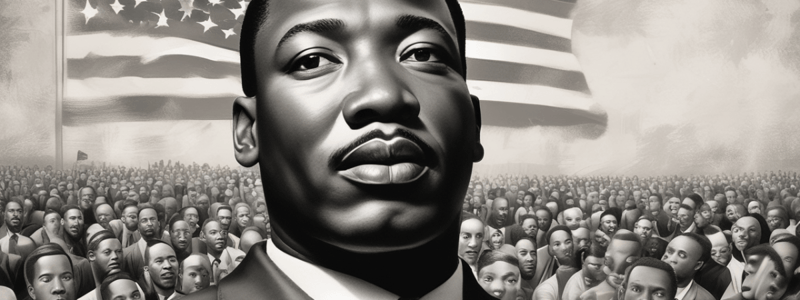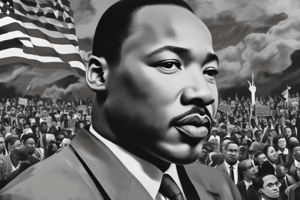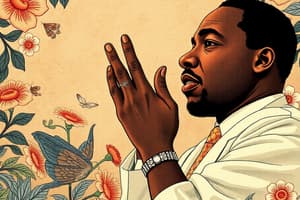Podcast
Questions and Answers
Where was Dr. Martin Luther King Jr. born?
Where was Dr. Martin Luther King Jr. born?
- Pennsylvania
- Atlanta, Georgia (correct)
- Montgomery, Alabama
- Boston, Massachusetts
What was Dr. King's area of study before he met Dr. Benjamin Elijah Mays?
What was Dr. King's area of study before he met Dr. Benjamin Elijah Mays?
- Law and medicine (correct)
- Psychology and sociology
- History and politics
- Theology and philosophy
Where did Dr. King meet his future wife, Coretta Scott?
Where did Dr. King meet his future wife, Coretta Scott?
- Pennsylvania
- Boston, Massachusetts (correct)
- Montgomery, Alabama
- Atlanta, Georgia
What sparked the Montgomery Bus Boycott?
What sparked the Montgomery Bus Boycott?
What was the cornerstone strategy of the SCLC?
What was the cornerstone strategy of the SCLC?
Where did Dr. King receive his Ph.D. in Systematic Theology?
Where did Dr. King receive his Ph.D. in Systematic Theology?
What was the name of Dr. King's fraternity?
What was the name of Dr. King's fraternity?
Where was the Southern Christian Leadership Conference (SCLC) formed?
Where was the Southern Christian Leadership Conference (SCLC) formed?
At what age was Dr. King admitted into Morehouse College?
At what age was Dr. King admitted into Morehouse College?
What was the church where Dr. King became the pastor?
What was the church where Dr. King became the pastor?
What was the name of Dr. King's father?
What was the name of Dr. King's father?
Where was King arrested and wrote his famous 'Letter from a Birmingham Jail'?
Where was King arrested and wrote his famous 'Letter from a Birmingham Jail'?
What was the main point of King's 'Letter from a Birmingham Jail'?
What was the main point of King's 'Letter from a Birmingham Jail'?
What was the main goal of the Poor People's Campaign?
What was the main goal of the Poor People's Campaign?
What was the outcome of the combined efforts of SNCC, SCLC, and other civil rights groups?
What was the outcome of the combined efforts of SNCC, SCLC, and other civil rights groups?
What can be inferred about King's views on the Vietnam War?
What can be inferred about King's views on the Vietnam War?
What was a lesser-known aspect of King's political views?
What was a lesser-known aspect of King's political views?
What was the result of King's assassination on the Poor People's Campaign?
What was the result of King's assassination on the Poor People's Campaign?
How did Americans view King during his lifetime?
How did Americans view King during his lifetime?
What was the main theme of King's last speech?
What was the main theme of King's last speech?
Flashcards are hidden until you start studying
Study Notes
• Dr. Martin Luther King Jr. is a symbol of peace, courage, sacrifice, and impeccable leadership in the modern civil rights movement.
• Dr. King was born in 1929 in Atlanta, Georgia, and at 15 years old, he was admitted into Morehouse College, an HBCU in Atlanta, where he pledged Alpha Phi Alpha Fraternity, the oldest black fraternity in the United States.
• Dr. King studied law and medicine at Morehouse, but after meeting Dr. Benjamin Elijah Mays, a minister, and president of Morehouse College, he changed his focus to follow in his father's footsteps as a minister.
• Dr. King received a Bachelor of Divinity in Theology from Crozer Theological Seminary in Pennsylvania and a Ph.D. in Systematic Theology from Boston University in 1955.
• While in Boston, Dr. King met his future wife, Coretta Scott, and they married, settling in Montgomery, Alabama, where Dr. King became the pastor of Dexter Avenue Baptist Church.
• The 1955 arrest of Rosa Parks sparked the Montgomery Bus Boycott, which Dr. King led, and after the successful boycott, he was invited to create an effort similar to the Montgomery Bus Boycott across the South.
• In 1957, 60 black ministers and civil rights leaders convened in Atlanta at Ebenezer Baptist Church to replicate the successful Montgomery strategy, forming the Southern Christian Leadership Conference (SCLC).
• The SCLC, led by Dr. King, focused on non-violence as their cornerstone strategy and aimed to bring national attention to the plight of black Americans.
• In 1963, Dr. King led a Good Friday demonstration in Birmingham, Alabama, where he was arrested and wrote his famous "Letter from a Birmingham Jail" in response to criticism from eight white clergymen.
• In the letter, Dr. King rejected the idea that what was happening in Birmingham wasn't his business and pushed back against the idea that if black people were just patient, equality would soon come.
• Dr. King famously asserted that the white moderate was an immense danger to the success of the civil rights movement, preferring order over justice.
• The SCLC worked alongside the Student Non-Violent Coordinating Committee (SNCC) towards similar goals, but with different approaches, often collaborating on events like the 1963 March on Washington for Jobs and Freedom and the 1965 March on Selma.
• The combined efforts of SNCC, SCLC, black and white citizens, and ministers from across the country led to the signing of the Civil Rights Act of 1964 and the Voting Rights Act of 1965.
• In 1967, the SCLC launched the Poor People's Campaign to close the wealth gap between whites and blacks and combat racialized poverty, but Dr. King was assassinated in Memphis, Tennessee, on April 4, 1968, before its completion.- The Poor People's Campaign collapsed after Martin Luther King Jr.'s death, but the Southern Christian Leadership Conference (SCLC) continued to aid black voter registration and support protests across the South.
- The late 1960s saw the growth of the Black Power movement, which led to disillusionment with non-violent protests and the rise of more militant leaders and intellectuals.
- Martin Luther King Jr.'s message is often reduced to his "I Have a Dream" speech, but a deeper analysis of his work reveals more radical and expansive political views, including advocacy for guaranteed universal basic income and employment.
- King was committed to non-violence, but he also spoke out against the Vietnam War and American imperialism, calling the US government "the greatest purveyor of violence in the world" in a 1967 speech.
- Despite being widely loved and respected today, King was not popular during his lifetime; in 1966, two-thirds of Americans didn't approve of him or his work, according to Gallup polls.
- Advocating for social change and pushing against the status quo often means being vilified, but it's necessary to build a better society, even if it means not being popular or well-liked.
- King's last speech, delivered on the day before his assassination, emphasized the importance of continuing to strive for a better world, even if he wouldn't be there to see it.
Studying That Suits You
Use AI to generate personalized quizzes and flashcards to suit your learning preferences.




